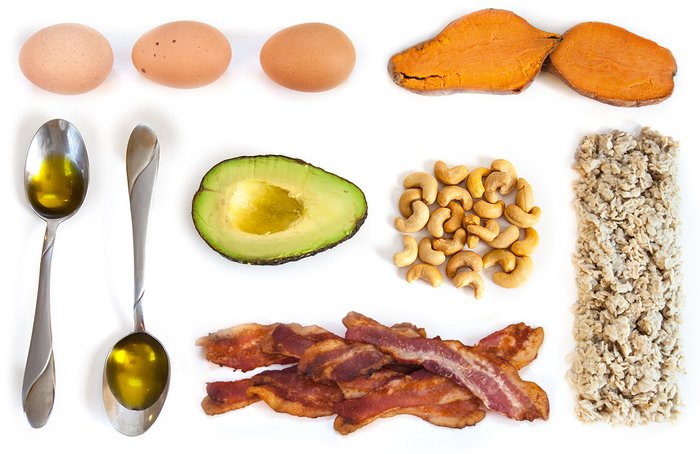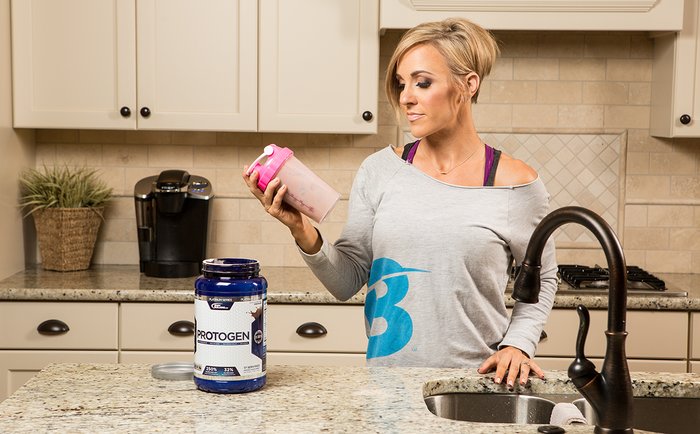Spend much time online observing (or getting in) arguments about fitness and nutrition, and you'll quickly see pundits on both sides resort to putting everything in terms of "right" or "wrong." Calories are everything, or they're pointless. Macros are all you need, or you shouldn't sweat them at all.
In truth, much of the nutrition information that exists out there isn't necessarily right, worthless, or wrong—it's simply more or less important to your goals. At the end of the day, simply learning to rank your fitness priorities and adhere to them consistently will get you much further than focusing your time and energy on finite minutiae.
The idea of putting nutritional priorities into a pyramid ranking was conceived by Eric Helms of 3DMJ, a site dedicated to natural bodybuilding. This is how he recommends you allot your time, energy, and attention (and finances) to meet your nutrition goals, and I agree. Start here, and start now!
Priority 1: Calories
You can call this "energy balance," or think of it as portion size if you're not into counting, but the fact of the matter is that you won't lose weight if you're consuming more calories than you're burning. The opposite holds true for those seeking to gain weight. Calorie intake is integral to progress in the direction you desire.
For the past few years, many gurus have tried to tell us that calories don't matter, that it's all about food quality and eating more frequently. The underlying theme that they often fail to miss, however, is that by switching to a nutrient-dense, high-fiber, alcohol-free approach, hundreds if not thousands of calories get eliminated, ultimately placing you in a calorie deficit.
To find out the calories you need to lose or gain weight, you must first find the daily calorie intake that allows you to maintain your weight across a 5- to 10-day period.
Once you find this value, eliminate or add 300-500 calories to place yourself in the appropriate deficit or surplus.
Everything else is secondary to this principle. You can eat all of the chicken and broccoli in the world, but if you're taking in more calories than you're burning, you will gain weight despite your clean-eating efforts.
The same goes for nutrient timing and supplements: You can take four magical pills 16 seconds after your last set, but if you're not eating enough, you won't gain.
Priority 2: Macronutrients
Macronutrients—macros for short—are the primary nutrients found in our food that provide our bodies with energy—protein, carbohydrates, and fats. Each has its own unique importance when it comes to enhancing your health and fitness.
The amount needed of each is highly individualized by such factors as age, size, nutrition and training history, goals, and preferences, but all three macros are necessary for a healthy approach to nutrition.

Proteins, carbs, and fats each have their own unique importance when it comes to enhancing your health and fitness.
Protein
Protein isn't always a high priority for a lot of people—until they get serious about their health and fitness. But when you want to transform your body for the better, it becomes immensely important. Yes, it can help you add muscle, but just as crucially, it also assists weight-loss efforts by positively impacting satiety and daily energy expenditure.[1] Protein recommendations are a dime a dozen online, but if you've never been serious about measuring your protein intake, start by aiming for 1 gram of protein per pound of body weight each day.
Carbohydrates
Carbohydrates are the brain and muscle's primary energy source. Again, you'll find widely varying recommendations, but here's my take: Match your intake with your training. The more active you are, the more carbohydrates you should consume. Make sure your pre- and post-workout meals have carbohydrates to promote optimal performance and recovery. Favor high-fiber, complex carbohydrates at most meals to support long-lasting energy.
Fat
Fat is essential for cell communication, vitamin storage, and promoting an optimal hormonal environment. The science is clear; you need them, and you shouldn't fear them.
Priority 3: Micronutrients
In-depth details regarding the importance of consuming ample vitamins and minerals is beyond the scope of this article. There are just too many of them! However, I can assure you that your parents were right when they pestered you daily to eat your fruit and vegetables, even if it's something that you don't see "pay off" right away like you can with, say, calories.
Vitamins and minerals support all bodily functions essential to breathing, growing, moving, and fighting off colds and infections. They are absolutely essential for good health. What's the point of having six-pack abs if you're always sick, sore, and feeling sluggish?
Of course, you won't survive on a multivitamin alone, which is why micronutrients come in third on the list, after daily calories and macronutrients. Plus, by favoring nutrient-dense macronutrients, you will reap the benefits of consuming many vitamins and minerals.
Priority 4: Meal Frequency And Nutrient Timing
You can argue about meal timing and "feeding windows" till you fall over famished, but if your calories, macros, and micros are not in place, meal timing is pretty much irrelevant.

Your parents were right when they pestered you daily to eat your fruit and vegetables.
However, once those three elements are in place, timing your meals can definitely provide you with additional benefits to support your health, body composition, and performance goals.
Personally, I recommend eating every 3-4 hours for most fit people. I simply don't see the "every two hours" or "fast for 20 hours, feed for 4" extremes working well for most people. But at the end of the day, your preferences and schedule matter most.
My one piece of advice: Be sure that you're fueling up sufficiently before and after your workout to promote hard training and to optimize recovery. No, you don't need to down a protein shake 60 seconds after finishing your last set. But after you've showered and cooled down, try to eat a protein-rich meal within an hour or so.
Priority 5: Supplements
Pills and powders are part of the pyramid, but let's be honest: They're the least important part. If you want to see them do their best work, it will only happen once all other principles are consistently in place.
A good starting supplement stack that I recommend would include the following:
Whey Protein
Whey protein is a rapid-digesting, complete protein, which makes it an excellent part of any pre- or post-workout meal. It works well with a range of macronutrient and caloric approaches, and is versatile enough to work either as a shake or mixed into oats, yogurt, or smoothies. If this is what it takes to get you up to a gram per pound of body weight, then do it!

If drinking a protein shake is what it takes to get you up to a gram of protein per pound of body weight, then do it
Omega-3 Fish Oil
Unless you're consuming plenty of fish, you will most likely benefit from an omega-3 fish oil supplement. Omega-3 fatty acids play a beneficial role in workout recovery, cognitive function, body composition, recovery, and a wide range of health markers that we're only recently starting to understand fully.[2-5]
Vitamin D
In a perfect world, we would get plenty of sunshine and outdoor exercise—but we don't live in a perfect world. As a result, a majority individuals are vitamin-D deficient.[6] The pros definitely outweigh the cons here, and the price is right.
Multivitamin
This is your safety net, to make sure that your focus on macros isn't costing you in important micros. You could also loop some of the better greens supplements in here, but in either case, don't believe that it's a replacement.
Are You Up To Snuff On The Big Stuff?
It all begins here; anything else you don't know about nutrition is secondary. Take care of these fundamentals first, and don't whip out your credit card for anything else until you have a solid grasp on these. Give priority to what's at the bottom of the pyramid, and then work your way up.
References
- Halton, T. L., & Hu, F. B. (2004). The effects of high protein diets on thermogenesis, satiety and weight loss: a critical review. Journal of the American College of Nutrition, 23(5), 373-385.
- Vaughan, R. A., Garcia-Smith, R., Bisoffi, M., Conn, C. A., & Trujillo, K. A. (2012). Conjugated linoleic acid or omega 3 fatty acids increase mitochondrial biosynthesis and metabolism in skeletal muscle cells. Lipids in Health and Disease, 11(142), 2090-2098.
- Albert, B. B., Derraik, J. G., Brennan, C. M., Biggs, J. B., Smith, G. C., Garg, M. L., ... & Cutfield, W. S. (2014). Higher omega-3 index is associated with increased insulin sensitivity and more favourable metabolic profile in middle-aged overweight men. Scientific Reports, 4, 6697.
- Eren, E., Yilmaz, N., Aydin, O., & Ellidag, H. Y. (2014). Anticipatory Role of High Density Lipoprotein and Endothelial Dysfunction: An Overview. The Open Biochemistry Journal, 31(8), 100.
- Madahian, S., Daniel Navab, K., Pourtabatabaei, N., Seyedali, S., Safar, S., Vazirian, S., & Hough, G. (2014). Inflammation, High Density Lipoprotein and Endothelium. Current Medicinal Chemistry, 21(25), 2902-2909.
- Dahlquist, D. T., Dieter, B. P., & Koehle, M. S. (2015). Plausible ergogenic effects of vitamin D on athletic performance and recovery. Journal of the International Society of Sports Nutrition, 12(1), 1-12.

